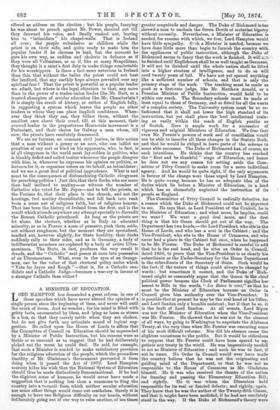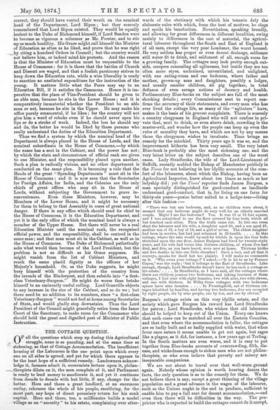A MINISTER OF EDUCATION.
LORD HAMPTON has demanded a great reform, in one of those speeches which have never altered the opinion of a single person since the beginning of time, and never will until the crack of doom. And no wonder ; for his mind is filled with gritty facts, uncemented by ideas, and lying as loose as stones in a box, so that they merely rattle when they are shaken, but do not give forth any articulate sound of logical sug- gestion. He called upon the House of Lords to affirm that the Committee of Council on Education should be superseded by a Minister of Public Instruction, but his reasons were so feeble or so unsound as to suggest that he had deliberately picked out the worst he could find. He said, for example, that such a Minister is needed to make satisfactory provision for the religious education of the people, which the groundless timidity of Mr. Gladstone's Government prevented it from doing when it passed the Act of 1870. Lord Hampton scarcely hides his wish that the National System of Education should thus be made distinctively Denominational. If he had the slightest sense of humour, he would never have made a suggestion that is nothing less than a summons to fling the country into a turmoil from which neither secular education nor some other things would come out scatheless. Surely it is enough to have one Religious difficulty on our hands, without deliberately going out of our way to raise another, of ten times
greater magnitude and danger. The Duke of Richmond is too shrewd a man to unchain the Seven Devils of sectarian bigotry without necessity. Nevertheless, a Minister of Education is needed, for reasons with which, we fear, Lord Hampton would have little sympathy. S-.;,1 a Minister is needed, because we have done little more than begin to furnish the country with the appliances of public instruction, although the Duke of Richmond seems to fancy that the work is finished. It will be finished until Englishmen shall be as well taught as Germans. It will not be finished until the whole nation shall be lifted into a higher stratum of intelligence, and to do so will need twenty years of toil. We have not yet opened anything like a sufficient number of schools, and that is only the primary stage of the work. The teaching must be made as good as a first-rate judge, like Mr. Matthew Arnold, or a Prussian Minister of Public Instruction, would hold to be within our reach. The Secondary schools must be made at least equal to those of Germany, and as fitted for all the wants of a complex society. The University system must be so re- fashioned that it shall not lower the high standard of its instruction, but yet shall place the best intellectual train- ing as easily within the reach of English youths as of Scotch. Here is ample work for a succession of vigorous and original Ministers of Education. We fear that even Mr. Forster's powers of work and of conciliation would not be able to inscribe all these changes in the Statute Book, and that he would be obliged to leave parte of the scheme to some able successor. The Duke of Richmond has, of course, no such intentions. He thinks that the country has reached the " Rest and be thankful " stage of Education, and hence he does not see any reason for setting aside the Com- mittee of Privy Council to make room for a more individual agency. And he would be quite right, if the only arguments in favour of the change were those urged by Lord Hampton. He is quite wrong, because he has no adequate idea of the duties which lie before a Minister of Education, in a land which has so shamefully neglected the instruction of its people as England.
The Committee of Privy Council is radically defective, for a reason which the Duke of Richmond could not be expected to see. He says that, as Lord President of the Council, he is the Minister of Education ; and what more, he implies, could we want ? We want a good deal more, and the first thing is that his Grace should get out of the way. The Department has two heads,—the Lord President, who sits in the House of Lords, and who has a seat in the Cabinet ; and the Vice-President, who sits in the House of Commons, and who never had a place in the Cabinet but once,_when he happened to be Mr. Forster. The Duke of Richmond is careful to add that he is the real head, and he cites an Order in Council, dated 1856, to prove that the Vice-President is as clearly his subordinate as the Under-Secretary for the Home Department is the subordinate of the Secretary of State. Such would be the fact, if the nature of things could always be changed by words ; but sometimes it cannot, and the Duke of Rich- mond might as reasonably argue that the Queen is the chief political power because the Clerk of Parliament signifies her assent to Bills in the words, "La Reins is vent," as that he . must be the Minister of Education because an Order in Council gives him authority over the Vice-President. It is possible that at present he may be the real head of his Office, and Lord Sandon only a humble assistant ; but if that be so, it is the fault of Lord Bandon. At all events, Lord Ripon was not the Minister of Education when the Vice-President was Mr. Forster. He showed that he was not in the clearest of all ways, by going to Washington to negotiate the Alabama Treaty, at the very time when Mr. Forster was executing some of his most difficult reforms. Nor did his absence cause the slightest uneasiness to the public. But it would be ridiculous to suppose that Mr. Forster could have been spared to ne- gotiate any treaty in the world. He was imperatively needed to act as Minister of Education ; and such he was in fact, if not in name. No Order in Council would ever have made the country believe that he was not the originating and guiding mind of the Department, or that he was not as responsible to the House of Commons as Mr. Gladstone himself. He it was who received the thanks of the nation for framing and passing the Elementary Edacation Bill; and rightly. He -it was whom the Dissenters held responsible for its real or fancied defects ; and rightly, again. They knew that he was the author of the Twenty-fifth Clause, and that it might have been modified, if he bad not resolutely stood in the way. If the Duke of Riohmond's theory were correct, they should have vented their wrath on the nominal head of the Department, Lord Ripon ; but they scarcely remembered that Lord Ripon existed. They would be equally lenient to the Duke of Richmond himself, if Lord Sandon were to become as vigorous a reformer as Mr. Forster, and to stir up as much hostility. His Grace might,call himself the Minister of Education as often as he liked, and prove that he was right by citing a hundred Orders in Council ; but the country would not believe him, or indeed mind his protests. And the reason is that the Minister of Education must be responsible to the House of Commons ; for it is there that the battles of Church and Dissent are waged, and that a foolish parsimony strives to keep down the Education rate, while a wise liberality is ready to sanction an unstinted expenditure for the instruction of the young. It matters little what the Peers may say to an Education Bill, if it satisfies the Commons. Hence it is im- perative that the place of Vice-President should be given to an able man, because he sits in the Lower H01188 ; and it is comparatively immaterial whether the President be an able man or not, because he sits in the Upper. He may make his office purely ornamental, if he likes ; for the country will not give him a word of rebuke even if he should never open his lips or do a stroke of work. Indeed, the less he should say and do, the better he would be liked by those persons who really understand the duties of the Education Department.
Thus we find a system by which the nominal head of the Department is always placed in the House of Lords, and the nominal subordinate in the House of Commons,—by which the name has a seat in the Cabinet, and the power has not ; by which the state and circumstance of official rank are given to one Minister, and the responsibility placed upon another. Such a plan is radically vicious, and no other department is conducted on the same plan. It is becoming a rule that the Heads of the great " Spending Departments " must sit in the House of Commons ; and it is now seen that the Secretaries for Foreign Affairs, for India, and the Colonies are the only chiefs of great offices who may sit in the House of Lords, without subjecting the Government to grave in- conveniences. Even these Ministers, however, may be Members of the Lower House, and it might be necessary for them to belong to that Assembly in cases of great national danger. If there is any office which should send its chief to the House of Commons, it is the Education Department, and yet it is the only office of which the nominal head is always a member of the Upper House. But there will never be a real Education Minister until the nominal rank, the recognised official power, and the responsibility, shall be centred in the same man; and that man must sit in the Cabinet, as well as in the House of Commons. The Duke of Richmond pathetically asks what would then become of the Lord President, but the problem is not so difficult as his Grace supposes. He might vanish from the list of Cabinet Ministers, and reach the same placid dignity as the officers of her Majesty's household. Or, as the Duke suggests, he might busy himself with the protection of the country from the inroads of the Rinderpest, and thus subside into "a first- class Veterinary-Surgeon." He might do worse than betake himself to an eminently useful calling. Lord Granville objects to any increase in the size of the Cabinet, and so do we ; but there need be no addition to its numbers, since "a first-class Veterinary-Surgeon " would not feel at home among Secretaries of State, and would gladly step downstairs. Thus the Lord President of the Council might gracefully retire from the Inner Court of the Sanctuary, to make room for the Commoner who should hold the great and dignified post of Minister of Public Instruction.



































 Previous page
Previous page